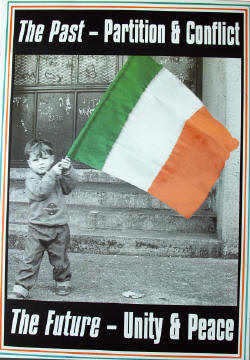 |
Irisch
Republikanische Solidarität
|
 |
McBrides consider European human rights case
Relatives of Belfast man Peter McBride, who was murdered in cold blood
by British soldiers James Fisher and Mark Wright in 1992, are
considering taking the British government to the European Court of
Human Rights over its decision not to discharge the two soldiers.
The two soldiers were convicted of murder, but served only a nominal
jail sentence before returning to the British Army. One of the men has
since been promoted.
British soldiers who commit a serious crime are routinely discharged
from service -- but the British Ministry of Defence (MoD) last week
revealed that no action would be taken against the soldiers.
McBride's mother Jean has now said that a European case was a distinct
possibility.
"I may have to take this issue out of the hands of the British
government and on to Strasbourg," she said. "The British government
has
left me without my only son and left two children without their
father."
She has also called on the North's "Human Rights Minister" John
Spellar
to explain why the McBride family had been misled in a meeting with him
regarding the two soldiers last week.
In the meeting between Spellar and the McBride family last Monday, the
minister said that no decision on the future of the two soldiers had
been made.
However, in a letter dated August 7 but delivered last Thursday, the
British MoD rules out any review of the status of the two Scots Guards.
The letter, signed off by British armed forces minister Adam Ingram, is
dated four days before Spellar's meeting with the McBride family.
Spellar did not inform the family of the decision when they met.
In the letter, Fisher is no longer referred to as "Guardsman' but
as
"Lance Corporal".
This is despite assurances made to the McBrides that neither soldier
would ever receive promotion.
Spellar sat on an army board in 2000 that allowed the two soldiers to
remain in the British armed forces. He was appointed to the Northern
Ireland Office as minister of state responsible for human rights,
criminal justice and equality in June.
The decision not to expel Fisher and Wright comes two months after a
court of appeal ruling in the North that found the British army had
been wrong to allow the two to remain in the armed forces.
Even former Ulster Unionist Assembly member Duncan Shipley Dalton has
criticised the decision to retain the two.
Dalton, who served for four years with the British Army in Belfast,
said: "The Queen's regulations clearly state that if a soldier is
convicted and sentenced to a period of imprisonment by a civil court,
then they should be discharged."
Sinn Fein's Gerry Kelly accused the government of turning its back on
justice.
"It is a case where they are clearly stating that it is okay for
members of the British army to shoot dead Catholics in cold blood and
get away with it.
"These two men should be removed from the British armed forces
immediately."
Mr Kelly accused Mr Spellar of abdicating his ministerial duty by
refusing to answer questions regarding his role surrounding the
decision to allow the two to remain as soldiers.
"The fact that John Spellar is now refusing to answer questions about
his role in this whole affair is clearly not good enough," he said.
Meanwhile, the Irish government has expressed serious concern over
Thursday's decision.
A spokeswoman for the Foreign Affair's department said that minister
Brian Cowen would be raising the matter with the British government as
a matter of urgency.
But despite the latest setback, Jean McBride insisted that her family's
campaign would continue.
"I have one message for this government: we are not going away,"
she
said.
"I will fight to have Wright and Fisher dismissed while I still have
a
breath in my body."
Letzte Änderung:
06-Sept-03